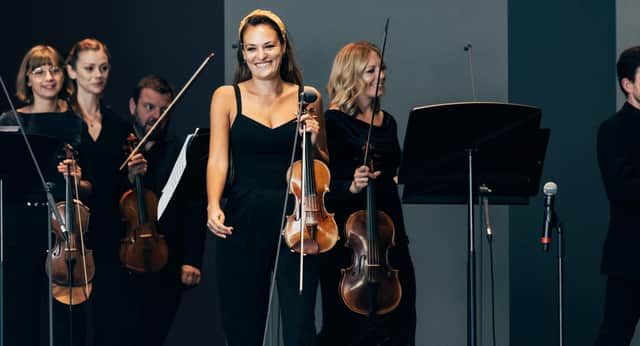EIF music reviews: Benedetti Baroque Orchestra | The Story of the Violin | Chineke! | RSNO


Benedetti Baroque Orchestra
Edinburgh Academy Junior School 4 stars
The Story of the Violin
Old College Quad 4 stars
Chineke!
Edinburgh Academy Junior School 4 stars
RSNO
Edinburgh Academy Junior School 3 stars
Saturday marked the Scottish debut of her recently-formed Benedetti Baroque Orchestra (****) By midweek she’d cut a lone figure on stage in a musical monologue dedicated to the art of the violin virtuoso. Still to come at the time of writing was her final appearance this weekend with hand-picked contemporary ensemble player-directing Stravinsky’s Faustian music theatre piece, The Soldier’s Tale.
Interest in the Benedetti Baroque Orchestra had already been ignited by its digital presence in last year’s online BBC Proms, and more recently through the release of its Decca debut album, featuring much of the same repertoire as Saturday’s concert. In this live context, it was a joy to have confirmed the supreme symbiosis that moulds this ensemble around the centrifugal force of Benedetti.
From Geminiani’s gutsy Concerto Grosso in D minor, La Folia, fuelled by apt and quirky idiosyncrasies, and the perfectly contrasting trio of Vivaldi concertos (including Summer from the popular Four Seasons), to the heart-melting lyricism of the Largo-Andante from Tartini’s A major Violin Concerto, the interpretational choices were a constantly exciting fusion of stylistic purity and spontaneous self-expression.
There was no lack of innate musicality in Benedetti’s playing, visually expressed in supple physicality and unquestionable sincerity. Now and again, her ensemble failed to respond with the same distinctive edge. And in the earlier of the evening’s two performances, instances where her own technical grip loosened, affecting both intonation and tone-production, were briefly unsettling.
The same ambivalence informed the initial Baroque half of Tuesday’s solo presentation – The Story of the Violin (****) – at Old College Quad. If the title was somewhat overambitious for an hour-long event, Benedetti made it work through minimal informal chat and a selective series of virtuoso pieces by four composers whose influence on violin repertoire was game-changing.
She began with Heinrich Biber and JS Bach, the latter’s gargantuan Chaconne casting Biber’s less sophisticated Passacaglia from the Mystery Sonatas into the relative shadows. The sheer technical prowess displayed in Benedetti’s performances was unquestionable, together with her skill in eliciting ephemeral, scintillating textures. What didn’t come over so convincingly was the unstoppable momentum of the Bach, occasionally roughly-hewn and aggressive towards a monster with a compulsive mind of its own.
The contrast introduced by the ensuing Paganini Caprices and Ysaÿe’s Sonata No 3 was instantaneous. Here was Benedetti in her absolute element, effortlessly defying the superhuman wizardry of Paganini’s notorious demands, and drawing out a beguiling soulfulness from the more austere 1920s’ language of Ysaÿe.
The other orchestra making its Festival debut was the fascinating Chineke! Orchestra (****), here with a smaller-than-usual line-up, but impressive in its choice of programme: the Scottish premiere of Judith Weir’s orchestral song-cycle woman.life.song with mezzo soprano Andrea Baker as soloist, and the world premiere of Ayanna Witter-Johnson’s Blush, a short instrumental flourish designed to accompany the Weir.
Weir’s song-cycle – commissioned by Jessye Norman to texts by Maya Angelou, Toni Morrison and Clarissa Pinkola Esté, and premiered 20 years ago in New York’s Carnegie Hall – explores the route to womanhood in its many guises, from the contemplative and troubled to the rapturous and funny. Baker saved her best moves for the comically-portrayed cabaret-style number, Breasts, gaining well-earned laughs en route.
But the engine room of this work is Weir’s ever-resourceful orchestration, as chillingly provocative as it is warm and evocative. American conductor William Eddins coursed its shifting emotions with silvery ease. He also inspired enough rhythmic punch in Witter-Johnson’s Blush, a catchy if amorphous piece of easy listening, to serve its purpose.
Had original EIF casting gone to plan, I wouldn’t have been writing again about pianist Steven Osborne, but here he was, a week after his impressive daytime recital, replacing planned soloist Daniil Trifanov in an all-Russian programme by the strings of the Royal Scottish National Orchestra (***) under Valery Gergiev.
When the vehicle is Shostakovich’s Piano Concerto No 1 – the one also featuring solo trumpet, played here with perceptive subtlety by RSNO principal Christopher Hart – the new prospect of Osborne was hardly bad news. And true to form, the Edinburgh-based 50-year-old served up all that is impetuous, thrilling, mournful and downright rude in this music. Towards the end there seemed a flurry of tempo discrepancy between him and Gergiev, but Osborne’s unflinching personality set the ship back on course.
Otherwise, this programme was a bit like March, coming in like a lion and going out like a lamb. Where Tchaikovsky’s Serenade for Strings provided a wonderfully wholesome and meaty opener, freely expressive and scorchingly sonorous, Stravinsky’s Apollon musagète proved a lukewarm conclusion that seemed more gaunt and ineffectual in the wake of the two lustier works.
A message from the Editor:
Thank you for reading this article. We're more reliant on your support than ever as the shift in consumer habits brought about by coronavirus impacts our advertisers.
If you haven't already, please consider supporting our trusted, fact-checked journalism by taking out a digital subscription at https://www.scotsman.com/subscriptions